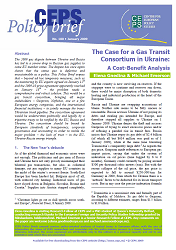№180. The Case for a Gas Transit Consortium in Ukraine: A Cost-Benefit Analysis
№180. The Case for a Gas Transit Consortium in Ukraine: A Cost-Benefit Analysis
Author(s): Elena Gnedina, Michael Emerson
Subject(s): Energy and Environmental Studies, Economic policy, International relations/trade, EU-Approach / EU-Accession / EU-Development
Published by: CEPS Centre for European Policy Studies
Keywords: Gas transit; consortium; Ukraine; Russia; EU;
Summary/Abstract: The 2009 gas dispute between Ukraine and Russia has led to a severe drop in Russian gas supplies to some EU member states. The dispute has once again shown that the status quo is defective and unsustainable as a policy. This Policy Brief argues that – beyond ad hoc temporary measures, such as the monitoring by EU experts agreed on January 12th and the 2009-10 price agreement apparently reached on January 18th – the problem needs a comprehensive and robust solution. This would be a gas transit consortium, bringing all major stakeholders – Gazprom, Naftohaz, one or a few European energy companies, and the international financial institutions – to jointly manage the trans- Ukrainian trunk pipeline. The consortium agreement would be underwritten politically and legally by a tripartite treaty to be ratified by the EU, Russia and Ukraine. The consortium should be bound by European standards of transparency, corporate governance and accounting in order to tackle the major problem – the lack of trust – in the EU-Ukraine- Russia energy triangle.
Series: CEPS Policy Briefs
- Page Count: 13
- Publication Year: 2009
- Language: English
- Content File-PDF

